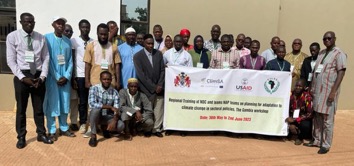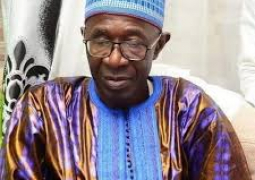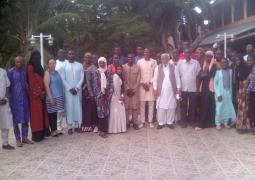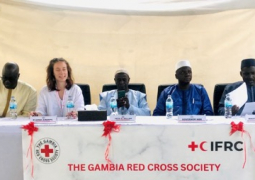
The aim of the workshop held at NAQAA Conference Hall was to strengthen Gambia’s capacity on the Nationally Determined Contribution (NDC) and National Adaption Plan (NAP) processes to integrate climate change into sectoral and national policies and to establish a synergy between the NDC and the NAPA.
Momodou Wuri Jallow, Adviser to the Minister of Environment, Climate Change and Natural Resources in deputising for his minister said The Gambia like other West African and Sahel countries is experiencing serious challenges in relation to climate change.
He noted that thisis clear from the negative impacts in the form of environmental degradation that had led to declining soil fertility, salinity as well as erosion and deforestation including mangrove dieback.
Mr. Jallow said there are also other consequences such as desertilication, loss of biodiversity and the destruction of the ecosystem base.
According to him, “If these trends are unabated, The Gambia and some other West African countries will by 2065 experience a temperature increase of +2.5 degrees C and a more erratic and highly reduced precipitation that will collectively lead to an increase in the frequency and intensity of the extreme climatic hazards already known in the region: violent winds, floods, ectremely long pockets of drought, heat waves, among others.”
He said the training would go a long way in helping participants assess current and future climate risks and their impacts in key sectors and also identify adaptation options and strategies and their mitigation co-benefits. The training he further said would also help them analyse and target land degradation trends in The Gambia for sebsequent planning and development in close alignment to climate change in the sectors and budgets.
Dr. Maguette Kaire, the Coordinator of the CILSS Regional Support Program onNatural Resource Management (NRM) and Climate Change said west African countries ability to institutionalise adaptation to climate change remains difficult, despite the existence of a political and institutional framework addressing the issues of environment, sustainable development and climate change.
“The framework for implementing NAPs and NDCs in our countries faces several challenges related to the governance of the process, the long-term planning of adaptation and mitigation strategies, adequate financing and the Measurement, Reporting and Verification (MRV) at all levels,” he pointed out, saying it is therefore urgent to see how the process of implementing the NAP and the NDC will be integrated into the political, strategic and budgetary planning processes already in the country.
He expressed their readiness to continue to invest in the full capacity building to support The Gambia and all countries of the CILSS-ECOWAS region in the implementation of the Paris Agreement in general and of their NDCs and NAPs in particular.





